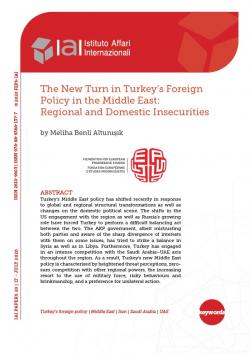The New Turn in Turkey's Foreign Policy in the Middle East: Regional and Domestic Insecurities
Turkey’s Middle East policy has shifted recently in response to global and regional structural transformations as well as changes on the domestic political scene. The shifts in the US engagement with the region as well as Russia’s growing role have forced Turkey to perform a difficult balancing act between the two. The AKP government, albeit mistrusting both parties and aware of the sharp divergence of interests with them on some issues, has tried to strike a balance in Syria as well as in Libya. Furthermore, Turkey has engaged in an intense competition with the Saudi Arabia–UAE axis throughout the region. As a result, Turkey’s new Middle East policy is characterised by heightened threat perceptions, zero-sum competition with other regional powers, the increasing resort to the use of military force, risky behaviours and brinkmanship, and a preference for unilateral action.
Paper produced in the framework of the FEPS-IAI project “Fostering a New Security Architecture in the Middle East”, July 2020.
-
Details
Rome, IAI, July 2020, 21 p. -
In:
-
Issue
20|17 -
ISBN/ISSN/DOI:
978-88-9368-137-7
Introduction
1. Turkey’s perceptions of its evolving neighbourhood
1.1 Increasing threat perceptions and securitisation
1.2 Zero-sum regional competition
1.3 Increasing use of military power
1.4 Turkey’s newfound unilateralism: The search for autonomy and balancing efforts with major powers
2. Turkey’s new foreign policy doctrine
3. The Iran-Saudi rivalry and Gulf security: A view from Turkey
Conclusion
References
Topic
Tag
Related content
-
Ricerca20/02/2020
Fostering a New Security Architecture in the Middle East
leggi tutto



